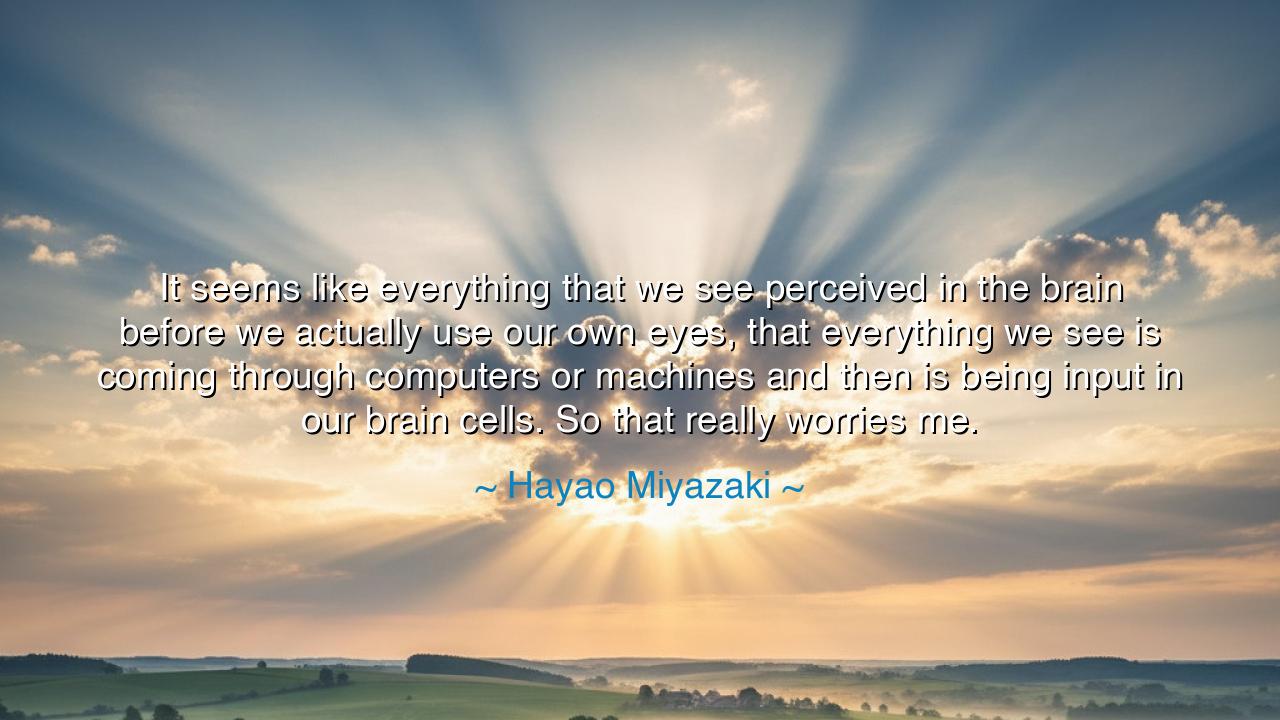
It seems like everything that we see perceived in the brain
It seems like everything that we see perceived in the brain before we actually use our own eyes, that everything we see is coming through computers or machines and then is being input in our brain cells. So that really worries me.






In the quiet corners of our world, there are minds that look beyond the present, beyond what is visible to the eye, and see the shadows of what might be. Hayao Miyazaki, a master of animation and storytelling, has ventured into these realms with words that echo through the corridors of time. His quote speaks not of the mechanical marvels that surround us but of the unseen forces, the subtle technologies, that shape our perceptions. "It seems like everything that we see is perceived in the brain before we actually use our own eyes," he muses. In these words, he calls us to consider the machinery, the systems, and the devices through which we now perceive the world. Are our eyes the true gatekeepers to our reality, or is it the machines we rely on that shape our vision? Technology has long intertwined with our senses, but in this reflection, Miyazaki's voice trembles with concern, as he sees the potential for these devices to dominate our thoughts, our choices, and our very perception of truth.
Miyazaki’s worry stems not just from the advancements in technology, but from its growing control over our lives. The machines, once simple tools to aid us in tasks, have evolved into entities that influence how we see, think, and interact. The brain, that ancient organ, has become a receptor for external inputs, not just the world around us, but also the narratives fed to us by machines. "Everything we see is coming through computers or machines," he warns, hinting at a future where the mind's true freedom may be compromised. This, too, was a fear voiced by George Orwell in his timeless work 1984, where the mind was shackled not by chains, but by the constant flood of controlled information. The distinction between reality and virtuality began to blur, as the power to shape the truth became a tool of those in control.
In the world Miyazaki describes, we are no longer the masters of our perceptions. Instead, we have become receivers, passive vessels into which the world is poured through pre-determined filters. This might seem familiar to those who have observed the rise of social media and the internet, where information is curated, tailored, and often manipulated, feeding us not what is true, but what we are encouraged to believe is true. Like a painter who, instead of using his own eyes to capture the world, relies solely on a machine to paint his vision, we may find ourselves in a world where our senses are no longer our own.
To truly understand Miyazaki’s concern, let us look to the ancient philosophers and their warnings about the power of perception. In the time of Plato, the allegory of the cave spoke of men who were chained, forced to see only the shadows of reality on a wall. These men, believing the shadows to be truth, had no idea that the world outside was full of light and color. Miyazaki’s words echo this allegory. Are we not like those men in the cave, shackled by the screens that offer us images of a world we do not touch with our own hands, but only feel through the cold embrace of technology? The machines may offer us clarity, but what if they are simply showing us a distorted reflection, keeping us trapped in a manufactured version of reality?
Consider the rise of artificial intelligence, which Miyazaki feared would one day become the invisible architect of our world. It is already shaping what we see, hear, and know. Algorithms now decide the news we read, the products we buy, and the very opinions we form. The more we rely on these systems, the more they shape us, guiding us down paths we did not choose. This fear is not without merit. AI, once a marvel of human ingenuity, now stands as a mirror reflecting the shadows of our desires, wants, and biases, amplifying them in ways we cannot easily understand or control.
Yet, within this cautionary tale lies a lesson. Miyazaki calls us to awaken to the world we are creating. He urges us to question the role of technology in our lives, not with fear alone, but with wisdom. How can we regain control of our perceptions and ensure that our minds remain free? The answer lies in mindfulness—in actively engaging with the world, not through screens, but with our own eyes, hearts, and hands. Just as the ancient storytellers once passed down wisdom through spoken word and the quiet study of nature, so too must we return to a more intimate relationship with the world around us. Let us not allow our minds to be mere receptors of information, but active creators of meaning, forging our path in a world not dictated by machines, but by our own will.
Miyazaki’s words are a call to action. They remind us that while technology may advance, the true power lies not in the tools we wield, but in the way we choose to wield them. Freedom does not come from passive acceptance but from the courage to question, to resist, and to create with our own hands and hearts. If we heed his warning, we might just find the path to reclaim our vision—not just of the world, but of our place within it.






AAdministratorAdministrator
Welcome, honored guests. Please leave a comment, we will respond soon